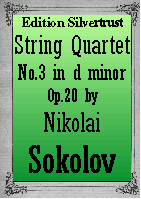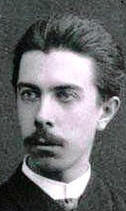Presents
Nikolai Sokolov
 |
 |
- Soundbites courtesy of Steve Jones |
String Quartet No.3 in d minor, Op.20
Nikolai Sokolov's String Quartet No.3 was composed in 1894. The quartet is typical of the writing of the Rimsky Korsakov school in that one is treated to many fine Russian melodies within the work. The opening movement, Allegro assai, moderato is also marked molto rubato and this constant tempo change creates added interest to what is already a very atmospheric musical canvas. The second movement, Allegretto grazioso, is a typical Korsakovian scherzo, light, charming and full of forward movement and not without lovely lyricism, all topped off with a wonderfully contrasting trio section. Next comes a slow movement, Sostenuto assai, perhaps the most striking of all. Brick by brick, as it were, Sokolov, carefully builds tension, almost imperceptively, to a powerful dramatic climax after which, slowly and just as carefully, tension is lessened until the music softly fades away in a meditative mode. The finale, Allegro non troppo, is full of life and nervous energy. Then without warning, Sokolov inserts a fugue which begins slowly and softly but, this serves as only a brief contrasting interlude before things are brought to a rousing finish.
Nikolai Sokolov (1859–1922) was born in St. Petersburg and studied at the conservatory there under Rimsky-Korsakov. He became one of several composers, mostly students of Korsakov such as Glazunov and Borodin, who came to be known as the Belaiev Circle, named after the important Russian music publisher, M.P. Belaiev. These composers dedicated themselves to creating a “Russian School”, (i.e. Russian-sounding). Sokolov eventually became a professor at the Petersburg Conservatory where Alexander Tcherepnin and Dmitri Shostakovich were among his many students.
He wrote music for the ballet and orchestra as well as chamber music, including three string quartets. Today, if he is known at all, it is for his contributions to a collection of short pieces for string quartet by the composers of the Belaiev Circle. The collection came to be known as Les Vendredis, It commemorated the chamber music concerts and banquets which took place most Friday evenings at the mansion of the publisher Belaiev. All of the pieces in the collection were specifically composed for those Friday evening concerts.
This is one of the very best quartets from the
late Russian Romantic era. It definitely deserves concert performance and
Presents
no great technical difficulties making it ideal for amateurs as well.
Parts: $24.95
Parts & Score: $31.95